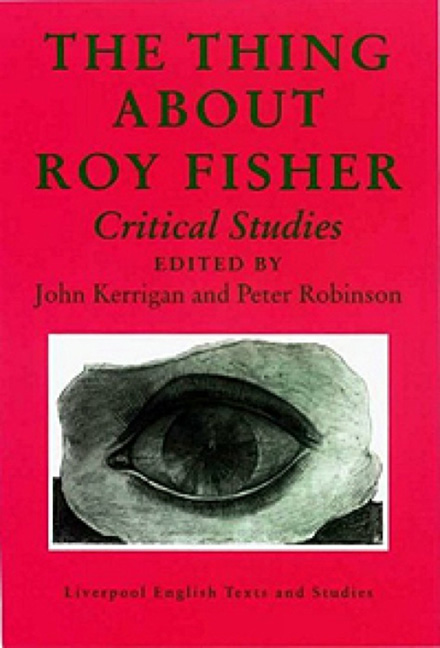Book contents
- Frontmatter
- Contents
- Notes on Contributors
- Acknowledgements
- Abbreviations
- Introduction
- 1 Roy Fisher on Location
- 2 ‘Menacing Works in my Isolation’: Early Pieces
- 3 TheWork of a Left-Handed Man
- 4 Osmotic Investigations and Mutant Poems: An Americanist Poetic
- 5 ‘Making Forms with Remarks’: The Prose
- 6 Cutting-Edge Poetics: Roy Fisher's ‘Language Book’
- 7 A Burning Monochrome: Fisher's Block
- 8 ‘The Secret Laugh of the World’
- 9 ‘Exhibiting Unpreparedness’: Self, World, and Poetry
- 10 ‘Coming into their Own’: Roy Fisher and John Cowper Powys
- 11 A Furnace and the Life of the Dead
- 12 Last Things
- Roy Fisher: A Bibliography
- Indexes
6 - Cutting-Edge Poetics: Roy Fisher's ‘Language Book’
- Frontmatter
- Contents
- Notes on Contributors
- Acknowledgements
- Abbreviations
- Introduction
- 1 Roy Fisher on Location
- 2 ‘Menacing Works in my Isolation’: Early Pieces
- 3 TheWork of a Left-Handed Man
- 4 Osmotic Investigations and Mutant Poems: An Americanist Poetic
- 5 ‘Making Forms with Remarks’: The Prose
- 6 Cutting-Edge Poetics: Roy Fisher's ‘Language Book’
- 7 A Burning Monochrome: Fisher's Block
- 8 ‘The Secret Laugh of the World’
- 9 ‘Exhibiting Unpreparedness’: Self, World, and Poetry
- 10 ‘Coming into their Own’: Roy Fisher and John Cowper Powys
- 11 A Furnace and the Life of the Dead
- 12 Last Things
- Roy Fisher: A Bibliography
- Indexes
Summary
Surveying the items listed in Derek Slade's excellent bibliography of Roy Fisher, one cannot help speculating as to the curious turn in this poet's American reception. Why, to put it baldly, has Fisher's poetry, published and praised as it was in American avant-garde little magazines of the 1960s and 1970s, all but disappeared from their counterparts of the 1980s and 1990s? Does this disappearance mean that Fisher has become an Establishment figure or that his work is too insular for an American audience? Surely not, for as John Kerrigan observes in his review of Fisher'smost recent collection, The Dow Low Drop (1996), ‘His refusal to strike marketable postures … has kept himrelatively unknown’ in England as well. But if Fisher is, as Kerrigan suggests, an experimental, antithetical poetic figure,why hasn't his work caught on in such successors of Kulchur (which published ‘Then Hallucinations’ in 1962) or Montemora (which brought out ‘Diversions’, 1-20 in 1977), as Sulfur or Temblor or Talisman, or in the countless little magazines, both in the US and in Canada, associated with Language poetry?
The American response would not be especially significantwere it not that it had been so enthusiastic. Reviewing six Migrant pamphlets for Kulchur (Summer 1962), Denise Levertov declares that ‘what English poetry desperately needed was a shot in the arm from American poetry…. Now at last something is happening’ (pp. 4-5). And she singles out Fisher along with Michael Shayer as ‘England's hope’. Fisher's City is compared to William Carlos Williams's Paterson and praised for its comparable ‘nakedness’, its ‘directness of feeling’ (p. 8). Again, in an interview of 1977, Jed Rasula compares The Ship's Orchestra to John Ashbery's Three Poems: ‘Both books,’ he remarks, ‘… have an extreme sort of concentration which is like wringing water out of a wash cloth’. And the discussion moves on, as is typical of Fisher commentary in the 1970s, to the question of the poet's relationship to the American ‘open form’ poetics of William Carlos Williams, Charles Olson and Black Mountain.
The link between Fisher (along with Tom Raworth, Gael Turnbull, Michael Shayer and a few others) and American counter cultural poetics was first made by Donald Davie in Thomas Hardy and British Poetry (1972), although Davie subordinated that link to what he took to be a more powerful, if subconscious, similarity between Fisher and Philip Larkin and, via Larkin, to Hardy.
- Type
- Chapter
- Information
- The Thing About Roy FisherCritical Studies, pp. 149 - 172Publisher: Liverpool University PressPrint publication year: 2000



